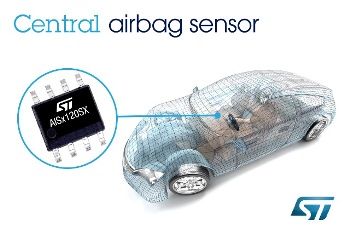Sep 24 2015
STMicroelectronics has introduced two central airbag crash sensors alongside its peripheral crash sensors, airbag system ICs, and safety microcontrollers, creating a complete airbag-electronics kit that supports the most stringent automotive-application and functional-safety requirements.
 STMicroelectronics' airbag MEMS sensors
STMicroelectronics' airbag MEMS sensors
The AIS1120SX and AIS2120SX single- and dual-axis 120g in-plane MEMS accelerometers are designed to be mounted in the vehicle’s Airbag Control Unit (ACU) responsible for evaluating the sensor data and triggering the appropriate restraint system.
Each sensor includes two independent sensing channels for redundancy and incorporates both slow and fast offset cancellation as well as precise temperature compensation for optimum stability. Built-in power-on self-test ensures reliability and run-time diagnostics help developers achieve the required level of functional safety. Both sensors have standard 400Hz signal bandwidth, which the user can extend to 1600Hz.
With around 1,000 MEMS-related patents and patent applications worldwide, ST has leveraged its leadership in this technology to integrate the precision mechanical sensing element in the same package with a 3.3V-compatible interface IC featuring a 14-bit digital SPI output.
The AIS1120SX and AIS2120SX sensors are specified over the extended temperature range from -40°C to +105°C. They will enter full production in Q1 2016 in a plastic full-molded SOIC8 package. Please contact your ST sales office for pricing options and sample requests.